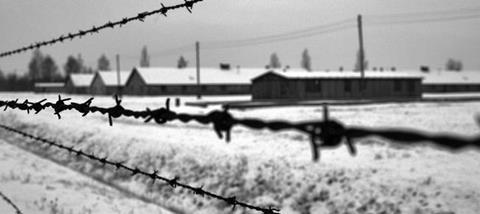
I had seen these gates in pictures and films many times before. Now I was standing under the most infamous sign in history. It was the standard Nazi slogan of choice for entrances to work camps: Arbeit Macht Frei, meaning ‘work makes you free’.
This gateway, railway line and control tower at nearby Birkenau all conspire to put this place at the head of the most evocative and chilling leader board of travel destinations. Here, in the environs of where I was nervously standing, more than a million human beings were systematically slaughtered only seven decades ago. And it wasn’t just Jews; gypsies, Poles, homosexuals and anyone else who failed to meet the Aryan ideal became subhuman.
There are many terrible scars in the history of our planet, but what was played out behind these infamous gates puts this place in a category all of its own.
Inside the camp
Our vivacious Polish guide Marcelina took us past a large group of young Israeli soldiers. They were having their photograph taken on their avuncular commanding officer’s iPhone; the Star of David flag proudly draped over the imposing sign. Somewhat ironic, I thought.
She led us on to a series of brick buildings, which remained almost as they were left in 1945. The conditions in the camp were explained to us as being worse than unimaginably terrible. Each brick building contained pictures, personal stories and long lines of photo fits of men, women and children in striped pyjamas along with huge, room-sized cabinets full of Holocaust artefacts.
The most harrowing was a display containing more than two tonnes of human hair. Hair was a marketable commodity during the war and nothing was wasted. At close examination you could make out the plaits of young girls among the grey. A scripture came to mind from a Sunday school project I did as a child: ‘But not a hair of your head will perish. Stand firm, and you will win life’ (Luke 21:18-19).
Entering the gas chamber
At the end of the tour, our group entered and walked around a gas chamber. As Marcelina led us in the cloud cover was almost black and the wind whipped up, causing the door to slam shut behind the last of our party. Our school group of six adults and 45 teenage girls stood in the dark, the only light entering from the skylight gaps that the Zyklon B gas canisters were placed in. For a split second it felt like time had stopped and the walls of the chamber were crying out.
Seconds later the door was reopened and we gratefully exited to a storm of hail and rain. Soon we were drinking coffee, sharing chocolate, warming up and even daring to laugh.
As we left, we passed supermarkets, schools and industrial units where men, women and children were at work and play. Even a rainbow had been laid on across the late-afternoon sky. Human beings have a wonderful knack for getting back to normal, but back then, for 6 million Jews, the ‘getting back to normal’ rule was on hold for five years.
Where the darkness is greatest his light is greater; where the anguish is strongest his hope is stronger
Back within the walls of our comfortable Krakow hotel, the teachers and girls in our group started to talk about the emotions that had been stirred by our day. Not much was said, as though saying the wrong thing would have minimised the experience. I still felt raw and numb. I knew the importance of processing experiences, but that would need to come later.
A refusal to do ‘Christianity-lite’
Six weeks on, I am writing this overlooking a beautiful autumnal scene of stillness and silence at a retreat centre in Northumberland. Age-old questions are going through my head. I often think about suffering and divine love, but today it seems to matter more.
My trip has transferred the theoretical to the critical. I don’t want to be in denial or incubated against the most desperate cries of the human heart. Nor do I subscribe to a ‘Christianity-lite’ type of faith.
I know some Christians who don’t want to grapple with these sorts of questions, wanting to live in some sort of happiness bubble. I even sense that some of my friends would consider that a trip to Auschwitz causes you to think about dark, unhelpful things. But not facing up to suffering, especially for a pastor, eventually leads to pretence. I want a faith to own and share that is resilient, strong and meets the challenge of suffering head-on. I won’t necessarily have neat, easy answers because sometimes the treasure is in the question.
Were you there, God?
Is the God I love present in suffering, or is he absent from it? I don’t believe the proof of God’s presence is necessarily a deliverance from suffering, though at a personal or macro level I am grateful when it does. Throughout history, there have been many times, as with Auschwitz, when no deliverance came, but I want to believe this is not the same as saying that God was absent. God may have his reasons for hanging fire, but he is not allowed to vacate the premises.
I discover I cannot compute any notion of divine neutrality, passivity or distance. I believe God is always present and fully engaged. I believe that God was present at Auschwitz, but not as deliverer. My God is present in pain, even if he appears to be mute or inactive. I see it every day in pastoral ministry. In this sense, my God is God of the gas chamber, God of the Nazis, God of the terrorist, God of the rapist and God of the paedophile as well as being God of the lovely people who attend my church. Where the darkness is greatest his light is greater; where the anguish is strongest his hope is stronger.
Love in the midst of pain
As I look out over rivers and trees, I realise that Jesus lived at Auschwitz back then just as he does today in Newcastle, where I live. I would rather he had brought deliverance, but for transcendent reasons that are far beyond my knowing, he didn’t.
It felt like the walls of the chamber were crying out
Zoe and I will never forget that particular cold day in October, nor will the group of teenage girls we accompanied. It was an outer journey that precipitated an inner crisis, albeit a helpful one. It was a journey not just of greater historical understanding, but into the challenge of reconciling unimaginable suffering with a God of love.
‘For he has not despised or scorned the suffering of the afflicted one; he has not hidden his face from him but has listened to his cry for help’ (Psalm 22:24).
Mark Elderis the runner-up in the Premier Christianity travel writing, and will receive a month’s supply of Jude’s ice cream. Read the winning entry from Karen Murdarasi, who will enjoy a retreat at Lee Abbey, in our latest issue. If you’re not a subscriber, you can sign up for a free copy of the magazine.




























